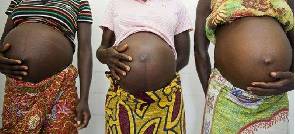HEALTH
2,186 pregnant mothers tested HIV positive in 2018

2,186 pregnant women tested positive for HIV in 2018, health officials in the Ashanti Region have revealed.
According to the officials, the patients were all put on Anti-Retroviral Drugs and monitored.
A total of 142,406 pregnant women were tested for HIV in the area of Prevention of Mother to Child Transmission (PMTCT).
Out of the estimated HIV positive population of 58,641 in the region, 21,828 are receiving treatment at the various ART and PMTCT centres. The region also had a marginal decrease in Family Planning (FP) acceptor rate from 25.8% in 2017 to 25.0% in 2018.
Ashanti Regional Director of the Ghana Health Service (GHS), Dr Emmanuel Tenkorang made these disclosures at the at the 2018 performance review of the Regional Health Directorate which was under the theme: ‘Strengthening Health System to Improve Maternal and Newborn health’.
The event was to offer the directorate the opportunity to identify its achievements, challenges and lessons learned and chart forward for the year 2019.
Dr Tenkorang said the priorities for the Directorate for 2018 included improving maternal and child health to reduce high maternal and newborn mortality, strengthening surveillance, improving health management information system and strengthening quality of health care facilities through peer review.
The regional health director stated that Antenatal Care coverage for the region reduced from 72.9% in 2017 to 69.1% in 2018.
He further stated that the Institutional Maternal Mortality Rate increased from 139/100,000 in 2017 to 184.4/100,000 in 2018.
Total maternal deaths increased from 162 in 2017 to 221 in 2018.
The number of audited maternal deaths also increased 143 representing 88.3% to 212 representing 95.9%.
19 Tuberculosis deaths recorded in 2018
Tuberculosis (TB) case notification declined from 2,208 in 2017 to 2,096 in 2018.
TB cure rate also reduced from 70% in 2017 to 64% in 2018 while treatment success has been stagnated at 87% over the last three years.
There was also a slight increase in the death rate from 10% in 2017 to 11% in 2018.
Dr Tenkorang revealed that 85 cases of MDR-TB were seen and managed in 2018, 11 cases cured and 55 still on different stages of treatment. Nineteen (19) of the patients he said have died either on treatment or before the start of treatment.
Challenges
Dr Tenkorang said the major challenges confronting quality healthcare delivery in the region include; Inadequate transportation at all levels, large numbers of uncompleted health infrastructure, inadequate and maldistribution of critical staff especially in deprived districts, delayed reimbursement of NHIA claims, inadequate funding for public Health intervention and High maternal and newborn.
He, however, indicated that the region plans to put in necessary intervention and also advocate for funding to address the challenges.
2019 targets
The Regional Director indicated that the region will focus on improving maternal and newborn care to reduce high maternal and newborn deaths through improve referral and quality of care and establishment of maternal health task team to provide technical assistance to referral facilities.
He said the Integrated Disease Surveillance System in the region will also be strengthened by community and clinical sensitization.
The Directorate he added will continue with its advocate to ensure that all uncompleted projects get the needed funding their continuation and completion.
-

 Lifestyle3 weeks ago
Lifestyle3 weeks agoRoad Safety Authority narrates how buttocks causes road accident
-

 GENERAL NEWS4 weeks ago
GENERAL NEWS4 weeks agoWhy 15 police officers stormed Owusu Bempah’s church – Kumchacha narrates
-

 GENERAL NEWS3 weeks ago
GENERAL NEWS3 weeks agoWatch how Ibrahim Mahama rode Honda superbike to pay last respects to late friend
-

 GENERAL NEWS4 weeks ago
GENERAL NEWS4 weeks agoHow Offinso residents storm destooled queen mother’s house, demand for new chief
-

 South Africa News4 weeks ago
South Africa News4 weeks agoWoman thrown out of a speeding taxi while on her way to work
-

 GENERAL NEWS5 days ago
GENERAL NEWS5 days agoDeadly clash between youth and navy personnel results in two deaths at Tema Manhean
-

 SHOWBIZ KONKONSAH7 days ago
SHOWBIZ KONKONSAH7 days agoJunior Pope’s Death: Video of John Dumelo refusing to join canoe for movie shoot over safety concerns resurfaces
-

 News Africa1 month ago
News Africa1 month ago‘Satanically dubious’ – SCOAN releases statement on BBC’s report about TB Joshua, church












